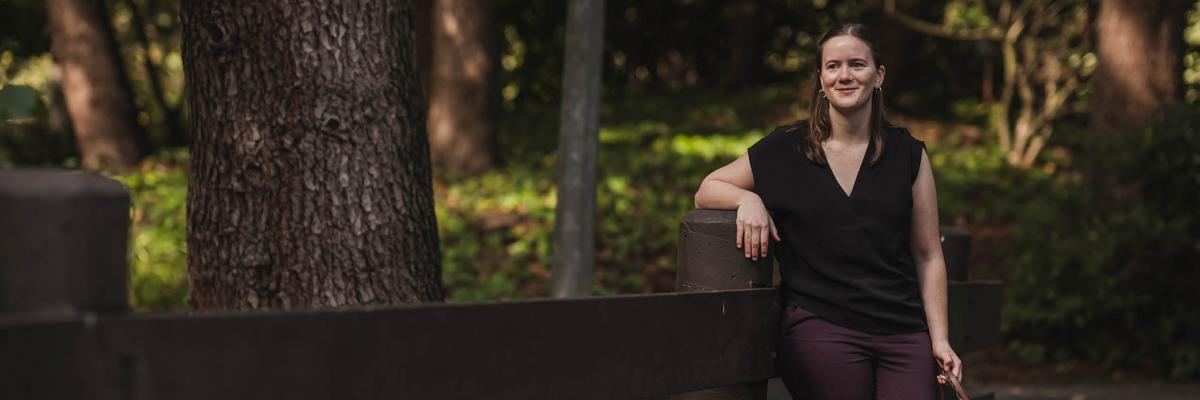Janna Faris wants to break down barriers and shatter glass ceilings. As a Canadian with sight loss, searching for a job was one of the most stressful experiences of her life. Through CNIB’s Come to Work program, she was able to secure a position with the Government of BC. Today, she aims to educate everyone about accessibility and inclusion. Blind since birth, Janna’s ultimate goal is to help others with disabilities find employment.
---
Tell us about your job.
I am an Employer Engagement Analyst with the BC Public Service. I help promote WorkBC as a source of talent to large, provincial-footprint employers in British Columbia, and raise awareness of WorkBC and its services. I also promote best practices for hiring underrepresented groups and D&I (diversity and inclusion) initiatives.
What do you love about your job?
My co-workers and supervisors work with me to help grow my skills while supporting me with any accessibility challenges. I feel valued, heard and understood. I want to stay with this employer because I feel I can make a difference and be secure in my role while doing so.
Tell us about one of your proudest moments that you’ve experience in your role.
Recently, I was co-facilitating a presentation on how words matter, and I filled in for my co-facilitator who was having tech issues. I got the chance to lead some very powerful discussions. The presentation went over so well that I was asked to be the accessibility tester for several important projects, including the roll-out of BC’s new vaccine passport.
What was your experience like with trying to find work as a Canadian living with sight loss?
Until I began applying to positions with the BC public Service, I was constantly worried I would be discriminated against or judged on my perceived abilities. My first position with the BC Public Service was an internship for recent grads with disabilities. Suddenly, my disability was a characteristic the employer was looking for, and not something that would hold me back. I felt much better about applying for this position because I knew I would be judged solely on what I would bring to the table. I really didn’t mind whether I got the internship because it meant the world to me to just be evaluated for who I am and not my disability. I got the internship and secured a permanent position four months later.
Did CNIB’s Come to Work program play a role in helping you look for work?
Yes! CNIB’s Come to Work staff in Vancouver told me about the internship with the BC Public Service – and that early morning call changed my entire career!
Was there anything that you learned from the Come to Work program that helped you with looking for work, or helped you in your current role?
You can never have too much support or too much experience. I learned to always seek out new things and new experiences and do my best at whatever I take on. Even if I don’t do as well as I hoped, I can still learn from it and do better next time.
Do you have any professional goals that you’ve set for yourself? If you feel comfortable, would you share them?
Yes! I want to be a mover and shaker. I want to break down barriers and shatter those glass ceilings. I want to climb that ladder while supporting my mentors and co-workers and educating those around me about accessibility and inclusion. Ultimately, I would like to find myself in a senior position where I can assist others with disabilities in securing employment.
Have you ever experienced attitudinal barriers – such as stereotyping, pity, ignorance or inferiority – either in a job interview or on the job?
Before my interviews with the BC Public Service, the second I would disclose my disability I would feel the door swing shut on my job opportunity. It felt like nobody wanted to give me a chance, which made me feel like maybe I really shouldn’t be given a chance.
If you could give one message to employers about working with Canadians with sight loss, what would you say?
It’s not as difficult or scary as you think it will be. If you are unsure how you can adapt your systems for a blind employee, go ahead and ask them. Odds are they will have some idea of how to adapt as they have been adapting things to meet their needs all their lives. Employees with disabilities are loyal to their employers and we stay where our unique skills are appreciated. Also, diverse perspectives make teams stronger!
If you could share advice with employees that may have a co-worker with sight loss, what would you say?
Be yourself and treat them as any other co-worker for the most part. You can always offer help or wait until they ask for help, but never just assume they need or want help. My sighted co-worker who is in the same position as me at work is incredibly intuitive and kind. She is an absolute joy to work alongside. I feel comfortable asking her or others for assistance when needed, and she does the same for me. We oversee slightly different things and we both help each other. I believe the making of a strong team is when everyone plays to their strengths and helps out where others need support.
